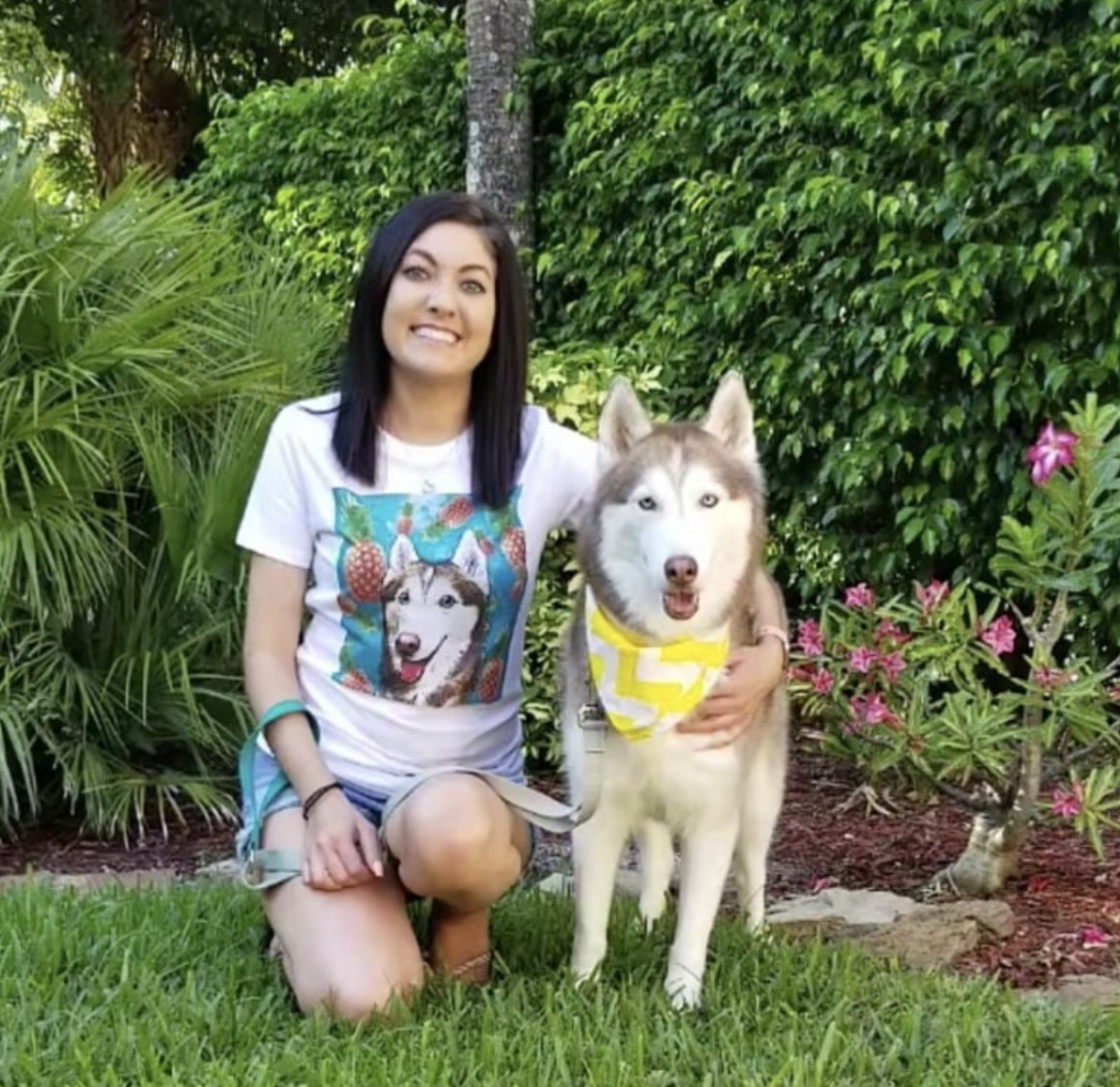For Pups With Short Attention Spans…
It is not recommended to give your dog chicken bones as a treat, or really any animal bone. Cooked bones, especially chicken bones, can easily shatter and injure your dog’s mouth, esophagus, or intestines. Raw bones are slightly tougher, but come with the added risk of food borne pathogens and gastrointestinal obsctruction. Stick to chews and pet-safe rubber and nylon toys for your dog to munch on.
We have a bone to pick with whoever wrote that classic “This Old Man” nursery rhyme. No, sir, do NOT give that dog a bone! And that goes for everybody. Chicken bones and other animal bones can be too risky for your pup to eat.
Are Chicken Bones Safe For Dogs To Eat?
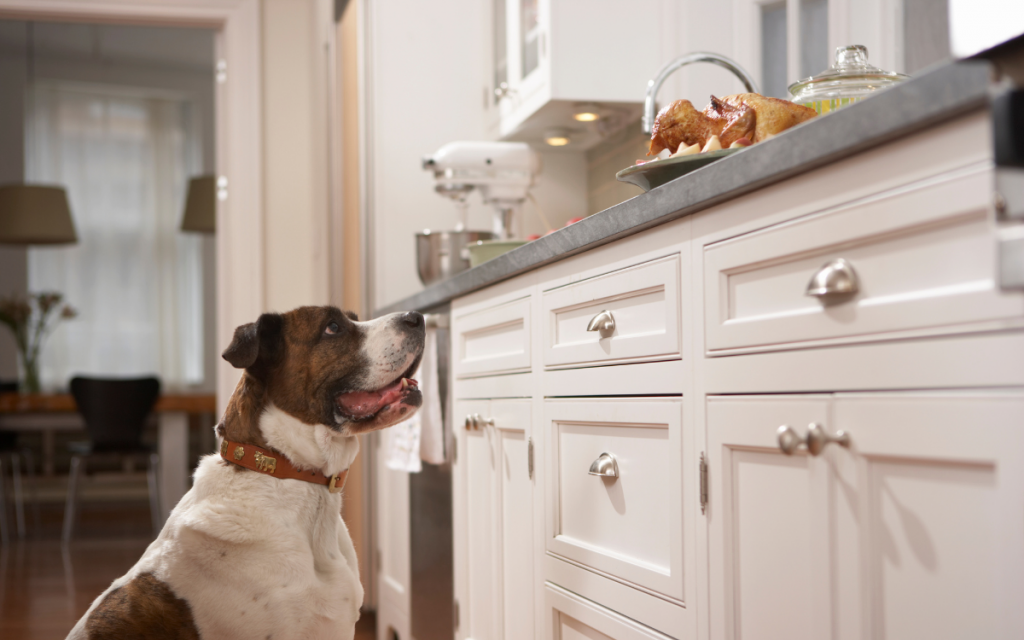

Can My Dog Have Cooked Bones?
Short Answer: No. Literally never.
When people think of giving their dog a bone, they’re usually contemplating giving them some leftovers from cooked chicken, turkey, or other meats. Bad idea! Animal bones become more brittle after cooking. That means they’re much more likely to splinter and become a choking hazard, cut up your pup’s digestive tract, lodge like a splinter in the esophagus (surgery in the esophagus is really risky, more than in the intestines), or cause a serious intestinal blockage. If pieces of bone pierce your dog’s digestive tract or become lodged in their intestines, this can quickly become an emergency. This can be a life-or-death situation, and require emergency surgery to hopefully repair internal damage. You should never intentionally give your dog cooked chicken bones, and should take precautions with bones left on counters, tables, or in the trash.
Can My Dog Have Raw Bones?
Short Answer: They’re still risky.
You may have read that treating your dog to some raw bones is a safer choice than cooked bones. This is because raw bones are less likely to splinter than cooked bones, and once in the stomach, small bone pieces usually become rubbery and soft (and therefore easier to pass) from the stomach acids. The key word is usually. Bad things can still happen with raw bones and you shouldn’t assume everything will be fine – why take the risk? Because when things go badly with bones, they go really badly. Any piece of bone can become a choking hazard, or pose a risk of internal punctures or intestinal blockage. There’s also the risk of raw-food pathogens to consider. All of these complications can be life-threatening. You may think you’re giving your dog a tasty treat when, in reality, they end up gnawing on a bone contaminated with salmonella and other dangerous pathogens that could make them sick.
Can My Dog Have Store-Bought Bone Treats?
Short Answer: Even the FDA says no.
There’s one aisle at your local pet store that mesmerizes almost any dog. It’s the one loaded with irresistible bones that cast spells turning any dog into a petty thief. Your pup obviously loves them enough to snatch them from the shelf, and they’re marketed toward dogs—so they must be safe, right? Actually, no! The FDA has even put out warnings on their site due to so many reported incidents of these bone treats causing intestinal blockages, choking, cuts and wounds, vomiting, diarrhea, bleeding, and even death. That’s a glaring warning to pet parents to research products before giving them to your four-legged friend. Just because something is sold in a pet store doesn’t mean it’s safe for your dog. Don’t give in to your pup’s begging eyes in the bone aisle!
Can My Dog Have Other Animal Bones?
Short Answer: Please no.
Any type of animal bone—chicken, turkey, deer, cow, human (yikes, where’d you get a human bone!?)—all come with the same risks. Both cooked and raw animal bones can become a choking hazard, create intestinal blockages, cause internal wounds, or even result in death. Plain and simple, there are just so many better choices of treats out there to give your pup!
What Do I Do If My Dog Ate A Chicken Bone?
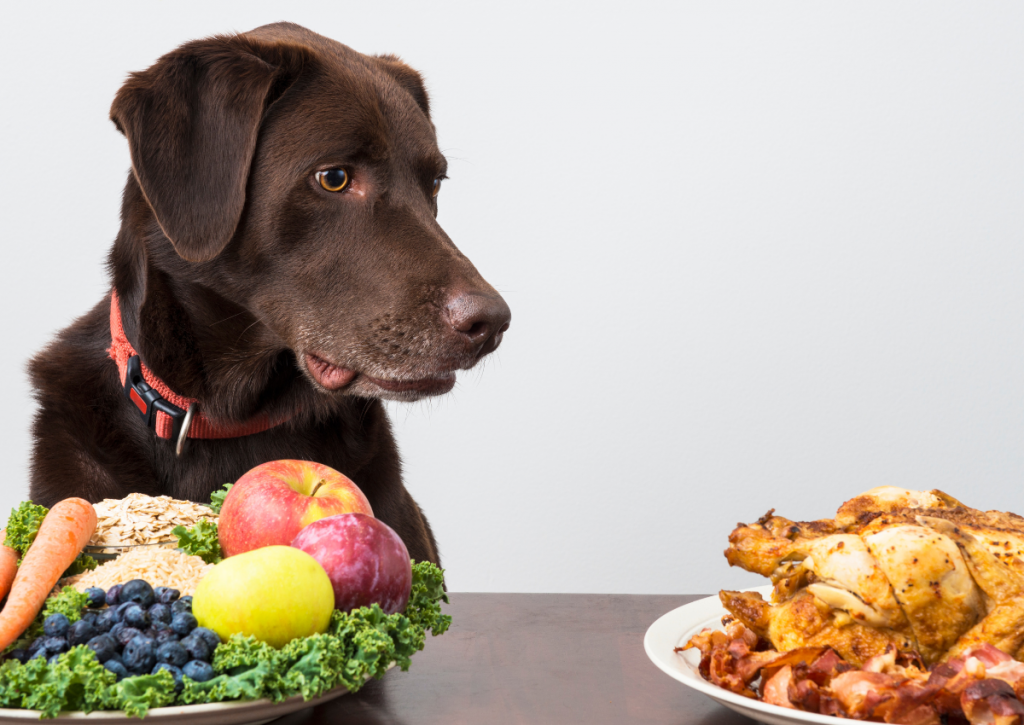

If Your Dog Appears Distressed:
- Make Sure Your Dog Isn’t Choking – If your dog is visibly choking and in distress, open their mouth and gently swipe a finger toward the center of the throat to clear the chicken bone (DISCLAIMER: be very careful with your fingers if you do this. Any dog, no matter how gentle, will be a bite risk if they are in distress). If you’re unable to reach the bone, perform the Dog Heimlich Maneuver immediately!
- Call Your Vet – If your dog appears distressed, even if they’re not actively choking, call the vet immediately. If you needed to perform the Dog Heimlich Maneuver, and you’ve cleared the chicken bone from their airway, call the vet to see if they want to examine your dog. They may want to check for any injuries from choking or from injuries that occurred while performing the Heimlich Maneuver—like broken ribs.
- Take Your Dog To The Vet Or An Emergency Vet – If your dog is extremely distressed, having trouble breathing, gagging, or vomiting get them to the vet immediately!
If Your Dog Appears Fine:
- Call The Vet – If you know your dog ate a chicken bone, but they don’t appear to be distressed, call your vet anyway. Depending on the circumstances—like how many bones your pup ate—your vet will be able to determine if they need to be examined.
- Closely Monitor Your Dog – After you call your vet, keep an eye on their appetite, their poops, and behavior over the next few days. Sometimes bones don’t cause a problem until they reach the intestines a few hours after the incident. If you notice any of the symptoms below, visit your vet immediately.
Signs Your Dog Is Choking On A Chicken Bone:
- Difficulty breathing
- Distress
- Gagging/retching
- Pawing at mouth
- Rubbing mouth on ground
- Excessive drooling
- Coughing
Signs Your Dog May Have An Obstruction From A Chicken Bone
- Distress
- Excessive drooling
- Coughing
- Difficulty breathing
- Loss of appetite
- Lethargy
- Vomiting
- Diarrhea
- Gagging/retching
Tips To Keep Your Dog Safe
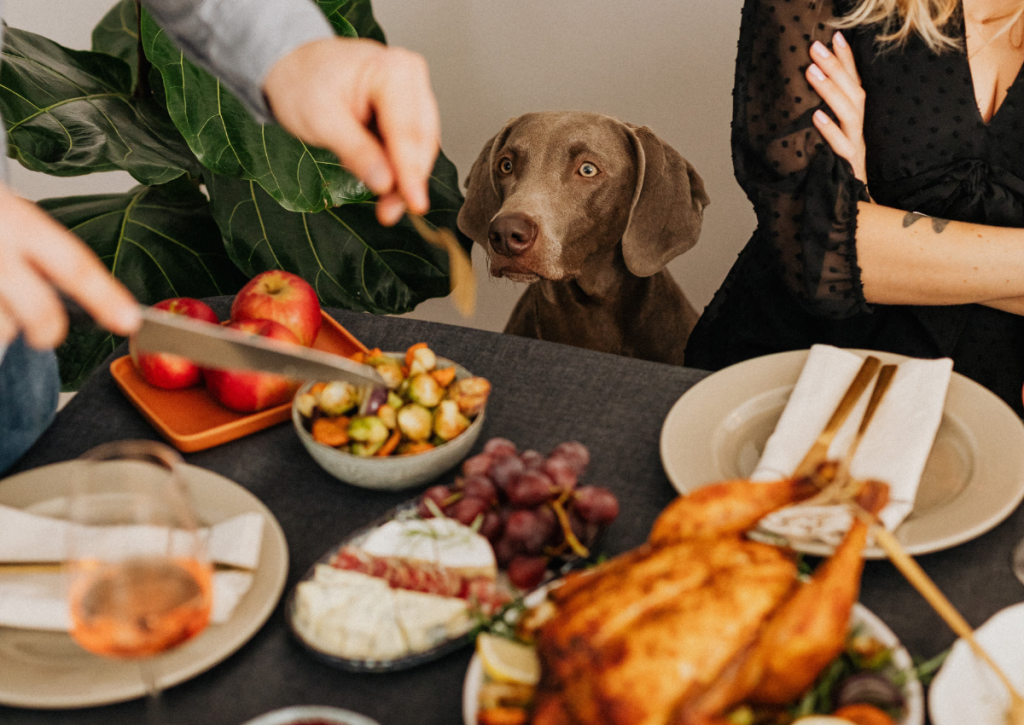

Be Careful Where You Place Cooked Meals – If your dog can reach the counter or table tops, make sure your cooked meal or bones are safely out of reach. Push them to the back of the counter, or let the food rest in the microwave or oven.
Take Out Trash With Bones – No trash can is safe. The only time that dogs seemingly develop opposable thumbs is when they want to get into trash cans. If you just cooked a meal with animal bones, take the trash out immediately, or secure the trash can. Don’t take the chance of leaving it around.
Take Caution During Holidays And With Visitors – Many families cook a traditional turkey or ham during holidays. The only problem is that these gatherings usually come with lots of guests and distractions. This always creates more chances for someone to accidentally drop food into the path of your pup’s snoot. The increased distractions also tend to open a window of time for dogs to demolish an entire feast during a counter surfing expedition while no one’s looking.
Keep An Eye Out For Bones During Walks – Maybe it’s just the neighborhood I live in, but for whatever reason there are always chicken bones and random bush bagels lurking around. To dogs, these are magical treasures, but we all know better. Make sure to keep an eye on what your dog’s nose is investigating during walks. Otherwise you’ll end up in a wrestling match to pry mystery meats from their jaws.
Avoid Buying Real Bones, Antlers And Hooves – Animal bones, antlers, and hooves sold in pet stores or online are too hard for your dog’s teeth. These tempting treats have a high risk of splintering off and causing puncture wounds or intestinal obstruction. These treats also have a bad track record for breaking or cracking teeth.
What Can I Give My Dog To Chew On Besides Bones?
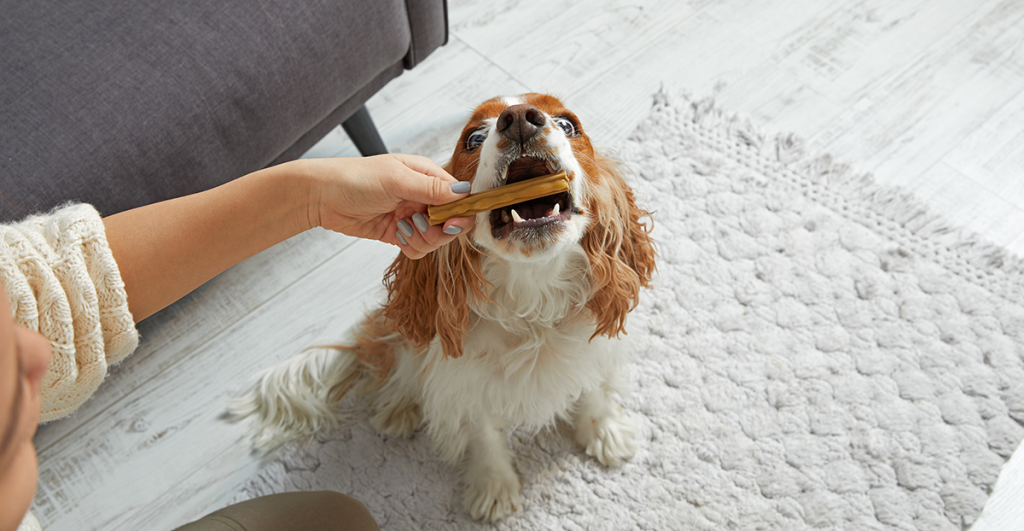

You’re likely looking for a treat to help clean your pup’s teeth, or wanting something that will keep them busy for a long time. There are so many treat and toy choices out there that are better alternatives to animal bones. These safer options keep your pup preoccupied with much less risk of causing harm.
- Dental Chews – If you’re looking for something to keep your pup’s teeth squeaky clean, daily doggie dental chews are the perfect choice! Combined with toothbrushing, they deliver proven results to improve plaque and tartar buildup!
- Rubber Chew Toys – Rubber chew toys are a great choice to keep your dog busy—even if they’re a super chewer. Just be sure to choose a toy that’s the right size for your dog, and remove any torn pieces during play. Toys that are too small or pieces that get torn off can become choking hazards, or end up causing a blockage in your pup’s gut.
- Tooth-Safe Nylon Chew Toys – Look for nylon chew toys that are able to be dented with your finger nail. Some nylon toys are simply too hard for your dog’s teeth. These can cause broken or cracked teeth.
- Rope Toys – Rope toys and tugs toys are another great choice for chewing and cleaning teeth. Just be sure to supervise your dog with these toys. Once they manage to tear strings off, they can become a hazard for choking or obstructions.
This article has been reviewed by Margo Hennet, DVM.
Margo Hennet, DVM, cVMA, and veterinarian at BARK is a canine nutrition, health, & wellness connoisseur. She has a combined 10 years of experience in clinical medicine, research, and education—that’s 70 dog years of know-how—and graduated from Colorado State University as a Doctor of Veterinary Medicine. She completed specialized training in internal medicine prior to working as a general practitioner in Colorado, has authored peer-reviewed publications and textbook chapters, holds certification in veterinary medical acupuncture, and is a member of the American Academy of Veterinary Nutrition and American Veterinary Medical Association.

